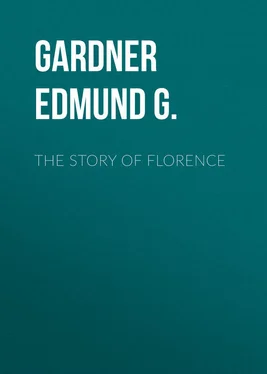Edmund Gardner - The Story of Florence
Здесь есть возможность читать онлайн «Edmund Gardner - The Story of Florence» — ознакомительный отрывок электронной книги совершенно бесплатно, а после прочтения отрывка купить полную версию. В некоторых случаях можно слушать аудио, скачать через торрент в формате fb2 и присутствует краткое содержание. Жанр: История, foreign_antique, foreign_prose, на английском языке. Описание произведения, (предисловие) а так же отзывы посетителей доступны на портале библиотеки ЛибКат.
- Название:The Story of Florence
- Автор:
- Жанр:
- Год:неизвестен
- ISBN:нет данных
- Рейтинг книги:3 / 5. Голосов: 1
-
Избранное:Добавить в избранное
- Отзывы:
-
Ваша оценка:
- 60
- 1
- 2
- 3
- 4
- 5
The Story of Florence: краткое содержание, описание и аннотация
Предлагаем к чтению аннотацию, описание, краткое содержание или предисловие (зависит от того, что написал сам автор книги «The Story of Florence»). Если вы не нашли необходимую информацию о книге — напишите в комментариях, мы постараемся отыскать её.
The Story of Florence — читать онлайн ознакомительный отрывок
Ниже представлен текст книги, разбитый по страницам. Система сохранения места последней прочитанной страницы, позволяет с удобством читать онлайн бесплатно книгу «The Story of Florence», без необходимости каждый раз заново искать на чём Вы остановились. Поставьте закладку, и сможете в любой момент перейти на страницу, на которой закончили чтение.
Интервал:
Закладка:
But it was only the names that were then introduced, to intensify a struggle which had in reality commenced a century before this, in 1115, on the death of Matilda. As far as Guelf and Ghibelline meant a struggle of the commune of burghers and traders with a military aristocracy of Teutonic descent and feudal imperial tendencies, the thing is already clearly defined in the old contest between the Uberti and the Consuls. This, however, precipitated matters, and initiated fifty years of perpetual conflict. Dante, through Cacciaguida, touches upon the tragedy in his great way in Paradiso XVI., where he calls it the ruin of old Florence.
"La casa di che nacque il vostro fleto,
per lo giusto disdegno che v'ha morti
e posto fine al vostro viver lieto,
era onorata ed essa e suoi consorti.
O Buondelmonte, quanto mal fuggisti
le nozze sue per gli altrui conforti!
Molti sarebbon lieti, che son tristi,
se Dio t'avesse conceduto ad Ema
la prima volta che a città venisti.
Ma conveniasi a quella pietra scema
che guarda il ponte, che Fiorenza fesse
vittima nella sua pace postrema." 5 5 "The house from which your wailing sprang, because of the just anger which hath slain you and placed a term upon your joyous life, "was honoured, it and its associates. Oh Buondelmonte, how ill didst thou flee its nuptials at the prompting of another! "Joyous had many been who now are sad, had God committed thee unto the Ema the first time that thou camest to the city. "But to that mutilated stone which guardeth the bridge 'twas meet that Florence should give a victim in her last time of peace."
And again, in the Hell of the sowers of discord, where they are horribly mutilated by the devil's sword, he meets the miserable Mosca.
"Ed un, ch'avea l'una e l'altra man mozza,
levando i moncherin per l'aura fosca,
sì che il sangue facea la faccia sozza,
gridò: Ricorderaiti anche del Mosca,
che dissi, lasso! 'Capo ha cosa fatta,'
che fu il mal seme per la gente tosca." 6 6 "And one who had both hands cut off, raising the stumps through the dim air so that their blood defiled his face, cried: 'Thou wilt recollect the Mosca too, ah me! who said, "A thing done has an end!" which was the seed of evil to the Tuscan people.'" ( Inf. xxviii.)
For a time the Commune remained Guelf and powerful, in spite of dissensions; it adhered to the Pope against Frederick II., and waged successful wars with its Ghibelline rivals, Pisa and Siena. Of the other Tuscan cities Lucca was Guelf, Pistoia Ghibelline. A religious feud mingled with the political dissensions; heretics, the Paterini, Epicureans and other sects, were multiplying in Italy, favoured by Frederick II. and patronised by the Ghibellines. Fra Pietro of Verona, better known as St Peter Martyr, organised a crusade, and, with his white-robed captains of the Faith, hunted them in arms through the streets of Florence; at the Croce al Trebbio, near Santa Maria Novella, and in the Piazza di Santa Felicità over the Arno, columns still mark the place where he fell furiously upon them, con l'uficio apostolico . But in 1249, at the instigation of Frederick II., the Uberti and Ghibelline nobles rose in arms; and, after a desperate conflict with the Guelf magnates and the people, gained possession of the city, with the aid of the Emperor's German troops. And, on the night of February 2nd, the Guelf leaders with a great following of people armed and bearing torches buried Rustico Marignolli, who had fallen in defending the banner of the Lily, with military honours in San Lorenzo, and then sternly passed into exile. Their palaces and towers were destroyed, while the Uberti and their allies with the Emperor's German troops held the city. This lasted not two years. In 1250, on the death of Frederick II., the Republic threw off the yoke, and the first democratic constitution of Florence was established, the Primo Popolo , in which the People were for the first time regularly organised both for peace and for war under a new officer, the Captain of the People, whose appointment was intended to outweigh the Podestà, the head of the Commune and the leader of the nobles. The Captain was intrusted with the white and red Gonfalon of the People, and associated with the central government of the Ancients of the people, who to some extent corresponded to the Consuls of olden time.
This Primo Popolo ran a victorious course of ten years, years of internal prosperity and almost continuous external victory. It was under it that the banner of the Commune was changed from a white lily on a red field to a red lily on a white field– per division fatto vermiglio , as Dante puts it–after the Uberti and Lamberti with the turbulent Ghibellines had been expelled. Pisa was humbled; Pistoia and Volterra forced to submit. But it came to a terrible end, illuminated only by the heroism of one of its conquerors. A conspiracy on the part of the Uberti to take the government from the people and subject the city to the great Ghibelline prince, Manfredi, King of Apulia and Sicily, son of Frederick II., was discovered and severely punished. Headed by Farinata degli Uberti and aided by King Manfredi's German mercenaries, the exiles gathered at Siena, against which the Florentine Republic declared war. In 1260 the Florentine army approached Siena. A preliminary skirmish, in which a band of German horsemen was cut to pieces and the royal banner captured, only led a few months later to the disastrous defeat of Montaperti, che fece l'Arbia colorata in rosso ; in which, after enormous slaughter and loss of the Carroccio, or battle car of the Republic, "the ancient people of Florence was broken and annihilated" on September 4th, 1260. Without waiting for the armies of the conqueror, the Guelf nobles with their families and many of the burghers fled the city, mainly to Lucca; and, on the 16th of September, the Germans under Count Giordano, Manfredi's vicar, with Farinata and the exiles, entered Florence as conquerors. All liberty was destroyed, the houses of Guelfs razed to the ground, the Count Guido Novello–the lord of Poppi and a ruthless Ghibelline–made Podestà. The Via Ghibellina is his record. It was finally proposed in a great Ghibelline council at Empoli to raze Florence to the ground; but the fiery eloquence of Farinata degli Uberti, who declared that, even if he stood alone, he would defend her sword in hand as long as life lasted, saved his city. Marked out with all his house for the relentless hate of the Florentine people, Dante has secured to him a lurid crown of glory even in Hell. Out of the burning tombs of the heretics he rises, come avesse l'inferno in gran dispitto , still the unvanquished hero who, when all consented to destroy Florence, "alone with open face defended her."
For nearly six years the life of the Florentine people was suspended, and lay crushed beneath an oppressive despotism of Ghibelline nobles and German soldiery under Guido Novello, the vicar of King Manfredi. Excluded from all political interests, the people imperceptibly organised their greater and lesser guilds, and waited the event. During this gloom Farinata degli Uberti died in 1264, and in the following year, 1265, Dante Alighieri was born. That same year, 1265, Charles of Anjou, the champion of the Church, invited by Clement IV. to take the crown of the kingdom of Naples and Sicily, entered Italy, and in February 1266 annihilated the army of Manfredi at the battle of Benevento. Foremost in the ranks of the crusaders–for as such the French were regarded–fought the Guelf exiles from Florence, under the Papal banner specially granted them by Pope Clement–a red eagle clutching a green dragon on a white field. This, with the addition of a red lily over the eagle's head, became the arms of the society known as the Parte Guelfa; you may see it on the Porta San Niccolò and in other parts of the city between the cross of the People and the red lily of the Commune. Many of the noble Florentines were knighted by the hand of King Charles before the battle, and did great deeds of valour upon the field. "These men cannot lose to-day," exclaimed Manfredi, as he watched their advance; and when the silver eagle of the house of Suabia fell from Manfredi's helmet and he died in the melée crying Hoc est signum Dei , the triumph of the Guelfs was complete and German rule at an end in Italy. Of Manfredi's heroic death and the dishonour done by the Pope's legate to his body, Dante has sung in the Purgatorio .
Читать дальшеИнтервал:
Закладка:
Похожие книги на «The Story of Florence»
Представляем Вашему вниманию похожие книги на «The Story of Florence» списком для выбора. Мы отобрали схожую по названию и смыслу литературу в надежде предоставить читателям больше вариантов отыскать новые, интересные, ещё непрочитанные произведения.
Обсуждение, отзывы о книге «The Story of Florence» и просто собственные мнения читателей. Оставьте ваши комментарии, напишите, что Вы думаете о произведении, его смысле или главных героях. Укажите что конкретно понравилось, а что нет, и почему Вы так считаете.












